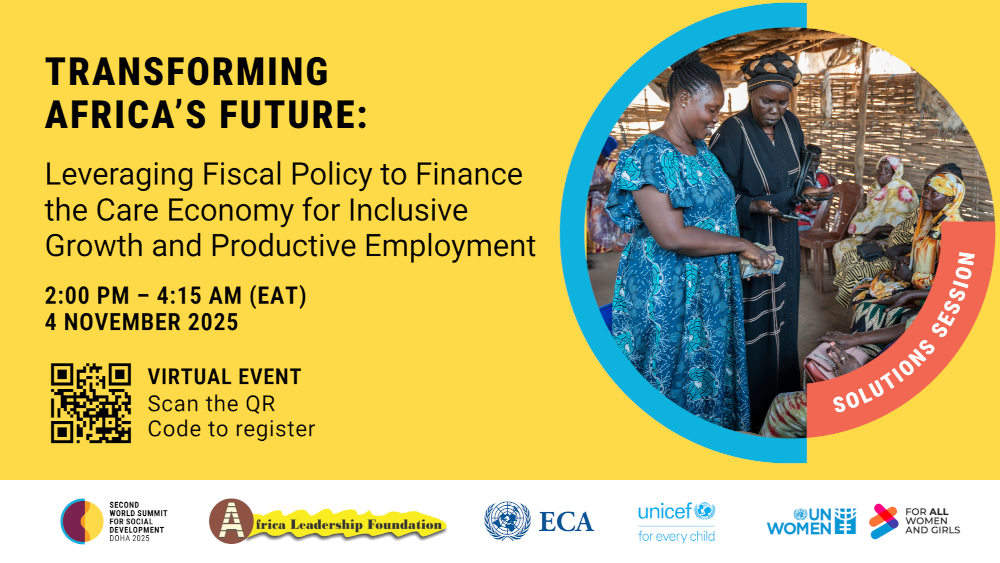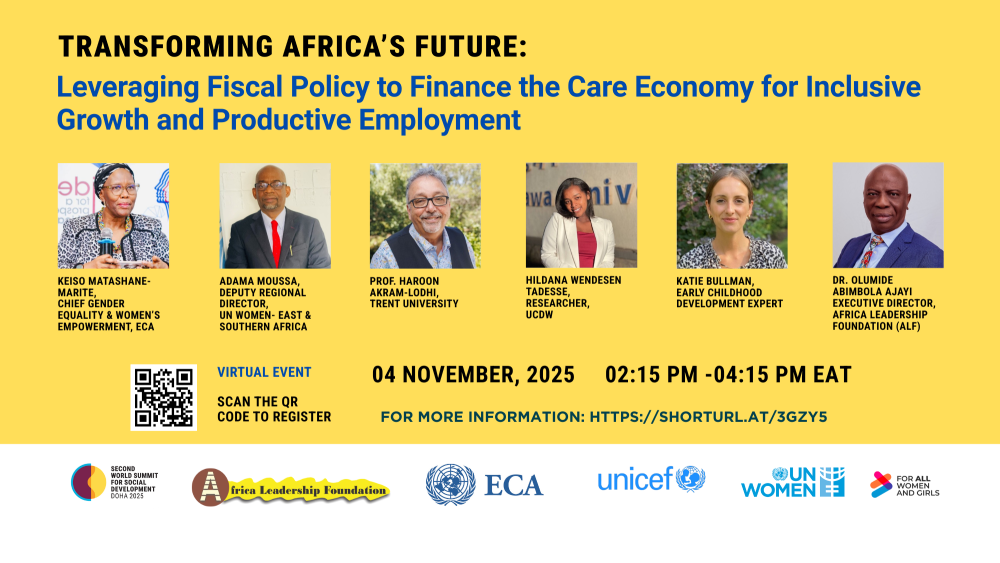

Profiles
Adama Moussa - Haroon Akram-Lodhi - Hildana Wendesen Tadesse - Katie Bullman - Keiso Matashane-Marite - Olumide Abimbola Ajayi
Background
The care economy—including childcare, eldercare, healthcare, and household work—is the invisible backbone of African economies, yet remains critically underfunded and undervalued. Over 70% of care work across Africa is unpaid and performed by women and girls, perpetuating gender inequalities, limiting educational and employment opportunities, and restricting women’s participation in the formal workforce. If monetised, unpaid care work could represent up to 9% of global GDP—nearly $ 11 trillion . In Africa, women and girls spend around 3.4 times more time on care activities than men, comprising as much as 8.8% of GDP in some countries . Despite this enormous value, unpaid care remains largely invisible in national accounts and is overlooked by policymakers.
Underinvestment in care services, regressive budgets, and mounting debt have shifted this burden to households, impeding inclusive growth and the realisation of the Sustainable Development Goals and Agenda 2063. Most African countries allocate minimal public funding to care, often viewing it as a private responsibility . Rising debt service and regressive tax systems further crowd out social budgets, disproportionately impacting poor women. International financing also fails to prioritise foundational care infrastructure, such as access to water and community childcare.
Several barriers persist. The first is the perception that care is a costly burden with few immediate benefits. The second is uncertainty over the scale, pace, and distribution of returns on investment in the care sector—concerns that allow vested interests to impede progress. As a result, care remains excluded from national policy priorities.
The impact is especially severe for girls, many of whom are forced to drop out of school at a young age to meet household care needs. This not only undermines Africa’s commitment to universal education but also blocks the continent from harnessing its demographic dividend. Unpaid care work leaves women and girls with less time and fewer choices for decent work, education, civic participation, and leisure, increasing their risk of poverty and limiting their potential.
Moreover, paid care roles—also dominated by women—often come with low wages and poor working conditions, further entrenching gender and economic disparities. However, strategic public investments in care infrastructure—such as universal childcare—offer huge transformative potential. For example, expanding childcare services in countries like Senegal and Tanzania could create hundreds of thousands to millions of formal jobs, drive economic growth, and reduce gender inequality. Every $1 invested in the care sector generates two to three times as many jobs as traditional infrastructure, with up to 78% of those jobs going to women . Improvements in care infrastructure—for example, accessible childcare, clean energy, and health services—could increase women’s labour force participation by up to 15% and ease the care burden shouldered by households, fostering inclusive growth . Additionally, increasing women’s labour force participation could broaden Africa’s tax base and strengthen fiscal space, as more women move into formal, taxable work.
Unlocking these benefits requires African countries to recognise the care economy as essential to economic and social infrastructure. This will demand gender-responsive budgeting, progressive tax policies, targeted social spending, and innovative financing—including linking debt relief and crisis financing to national commitments on care. Partnerships across public, private, and community-led models, as well as scaling up proven innovations such as Rwanda’s onsite childcare—which has reduced absenteeism among female workers by 22% and boosted productivity —are key steps forward. Progressive efforts like Kenya’s national care policy, aimed at institutionalising care and addressing unpaid work, serve as evidence-based models for the region.
To support reform, it is vital to improve data and accountability—using tools such as the Africa Care Economy Index to map gaps, recognise the full value of care, and set meaningful targets for gender equality and sustainable development. Financing Africa’s care economy is thus not only an issue of women’s rights but a strategic investment in inclusive growth, resilience, and long-term prosperity.